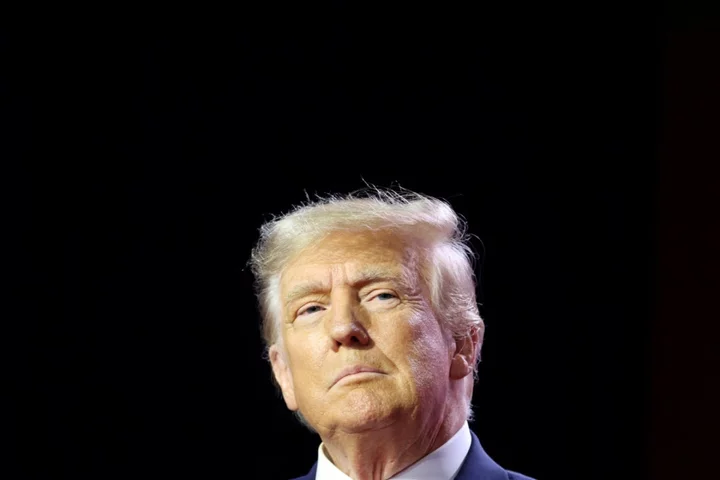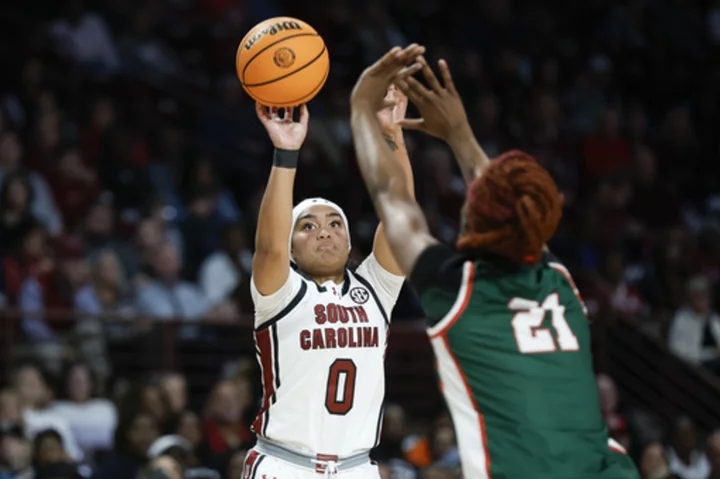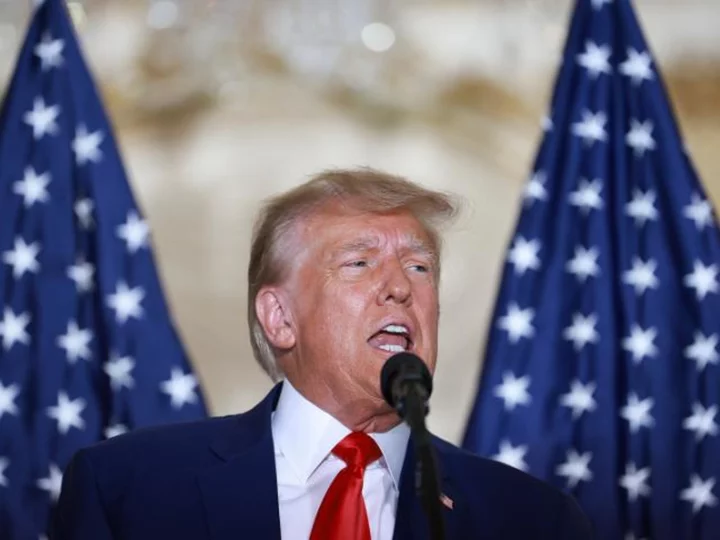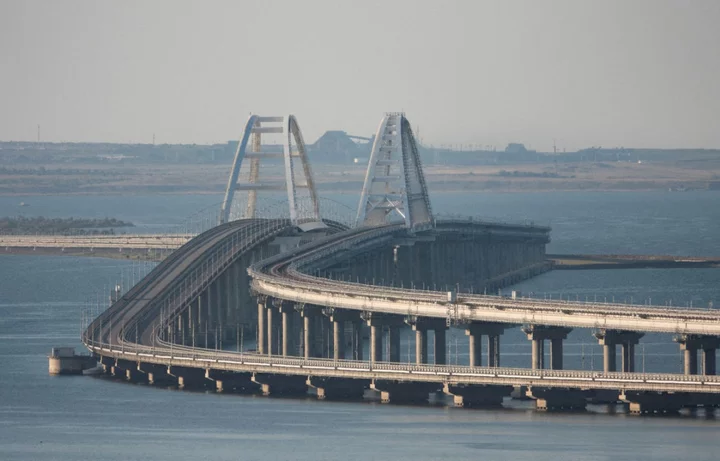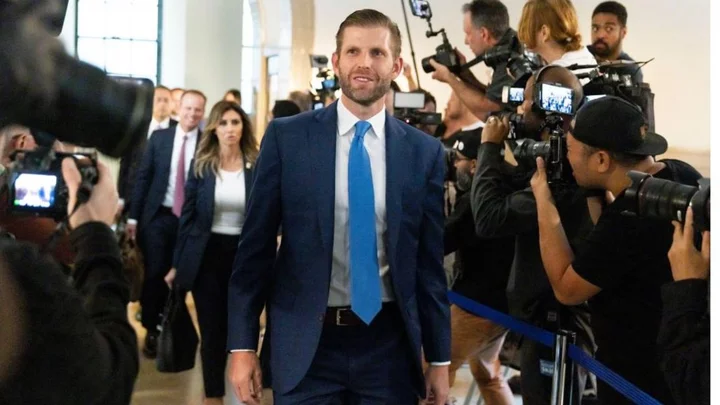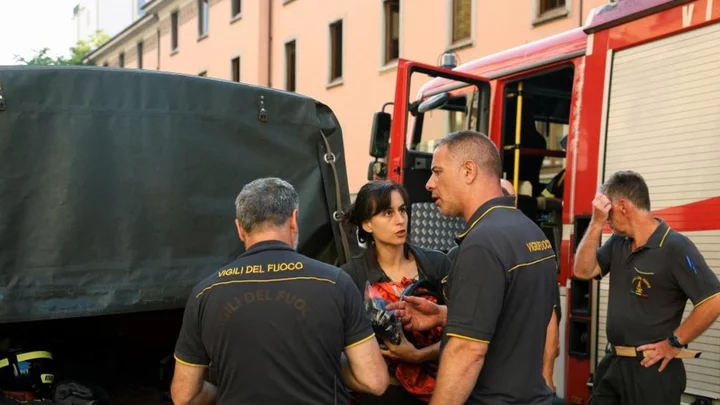Less than a mile from where he was sworn in as the 45th president of the United States, Donald Trump has arrived at a Washington DC courthouse to face four criminal charges stemming from his attempt to overturn the election he lost to Joe Biden less than three years ago. Mr Trump is expected to plead not guilty to each charge of the four-count indictment in a second-floor courtroom at the E Barrett Prettyman Courthouse on 3 August, just a short walk from where a mob of his supporters began assaulting police officers at the start of the January 6 attack on the US Capitol. His motorcade entered the courthouse complex through a below-ground entrance after a short drive from Ronald Reagan Washington National Airport in nearby Virginia, where Mr Trump’s bespoke Boeing 757 had landed following a short flight from Bedminster, New Jersey. Mr Trump is expected to be represented in court by John Lauro, a veteran Washington-based criminal defence attorney, and Todd Blanche, the New York-based lawyer who is leading his defence in the other criminal cases against him. The twice-impeached, now-thrice-indicted ex-president’s appearance in criminal court – his third since April – comes just two days after a Washington DC grand jury charged him with three criminal conspiracies and obstruction in connection with his attempts to overturn the results of the 2020 presidential election. In a poetic twist of fate, Mr Trump’s latest arraignment brought him to the exact same courthouse where hundreds of people have been tried, convicted and sentenced to terms in prison as long as 18 years for charges in connection with January 6. Mr Trump, the man Liz Cheney once credited with having “assembled” and “summoned” the riotous mob, is now the latest defendant among them. But more than two years after he exhorted the mob he assembled to march to the Capitol, Mr Trump’s ability to rally crowds to his defence appears to have waned. A relatively small number of pro- and anti-Trump demonstrators joined the dozens of news outlets and makeshift studios on the courthouse grounds. Law enforcement agencies erected temporary barriers around the building and surrounding streets. Many of the pro-Trump figures who came to Washington appeared to be from the same group of die-hard supporters who flocked to his prior federal arraignment in Miami, including members of the “Blacks for Trump” group often seen behind him at his campaign rallies. Another recognisable personality who came to the courthouse was Randy Credico, a comedian and radio host who gained a measure of prominence when he was a witness at the 2019 trial of longtime Trump associate Roger Stone on charges that the veteran GOP operative lied to Congress and committed witness tampering by threatening to harm Mr Credico’s emotional support dog, a Havanese called Bianca. Mr Stone, who was convicted of those charges, was later pardoned by Mr Trump before he left office. The latest criminal charges against Donald Trump The latest four-count indictment against Mr Trump alleges four crimes: conspiracy to defraud the United States, conspiracy to obstruct an official proceeding, obstruction and attempt to obstruct an official proceeding, and conspiracy against rights. The indictment also lists six unnamed co-conspirators, including Trump-linked attorneys and Justice Department officials. Prosecutors have outlined a multi-state scheme built on Mr Trump’s legacy of lies and conspiracy theories to undermine the democratic process, culminating with an attack on the US Capitol fuelled by that same baseless narrative. According to prosecutors, then-President Trump and his allies conspired with officials in states that he lost to invalidate ballots and use fraudulent electors to cast their electoral college votes on his behalf, relied on the Justice Department to implement the plan, and pressured then-Vice President Mike Pence to certify what was a fraudulent outcome when he presided over a joint session of Congress on 6 January, 2021. After Mr Pence refused, Mr Trump and his alleged co-conspirators “exploited” the chaos from a mob of his supporters to delay the certification and make a last-ditch effort to reverse the results, according to the indictment. “Despite having lost, [Mr Trump] was determined to remain in power,” the indictment states. “These claims were false, and the Defendant knew that they were false. In fact, the Defendant was notified repeatedly that his claims were untrue – often by the people on whom he relied for candid advice on important matters, and who were best positioned to know the facts – and he deliberately disregarded the truth.” Mr Trump and his allies and right-wing pundits have accused President Biden and the US Department of Justice of “weaponising” the federal government against the former president, cast as a victim of political persecution against his Democratic rival. They claim that the latest indictment is a threat to his First Amendment rights to refute his election loss. The indictment, crucially, states that Mr Trump has the right – “like every American” – to falsely state whatever he wants about the election, even to claim victory when in fact has not. What he cannot do, prosecutors argue, is weaponize those lies in a conspiracy to overturn the results. “Each of these conspiracies – built on the widespread mistrust [Mr Trump] was creating through pervasive and destabilizing lies about election fraud – targeted a bedrock function of the United States federal government,” according to the indictment. More criminal charges and trials ahead The case is far from Mr Trump’s only legal obstacle as he campaigns for the 2024 Republican nomination for president. Mr Trump faces two other criminal cases that are scheduled for trial next year. The first, starting March 2024, will be in his former home state of New York, where a Manhattan prosecutor in April charged him with falsifying business records in connection with hush money payments used to silence stories of his alleged affairs in the lead-up to his 2016 election, marking the first-ever criminal indictment of a former president. Two months later, he will appear in a South Florida federal courtroom to be tried on a 40-count federal indictment accusing him of illegally retaining classified documents at the Palm Beach mansion turned social club where he maintains his primary residence, and conspiring to obstruct a federal probe into his alleged unlawful retention of the documents with the aid of two co-conspirators. He has pleaded not guilty in both cases. Mr Trump, his three eldest children and his business empire also face a $250m lawsuit from New York Attorney General Letitia James following a three-year civil investigation into allegations of fraud. That case is expected to head to trial on 2 October. And in Georgia, a grand jury is hearing evidence and witness testimony surrounding a pressure campaign from Mr Trump and his allies to overturn 2020 election results in that state following a two-year investigation from Fulton County District Attorney Fani Willis. Ms Willis has indicated that potential charges stemming from that investigation would arrive this month. Read More Trump arraignment live updates: Trump heads to DC court to be arraigned for 2020 election charges Trump, January 6 and a conspiracy to overturn the 2020 election: The federal investigation, explained Eight key revelations from Trump’s January 6 indictment Donald Trump’s latest indictment is a test for America Who are Trump’s six alleged co-conspirators in the 2020 election probe case?
Less than a mile from where he was sworn in as the 45th president of the United States, Donald Trump has arrived at a Washington DC courthouse to face four criminal charges stemming from his attempt to overturn the election he lost to Joe Biden less than three years ago.
Mr Trump is expected to plead not guilty to each charge of the four-count indictment in a second-floor courtroom at the E Barrett Prettyman Courthouse on 3 August, just a short walk from where a mob of his supporters began assaulting police officers at the start of the January 6 attack on the US Capitol.
His motorcade entered the courthouse complex through a below-ground entrance after a short drive from Ronald Reagan Washington National Airport in nearby Virginia, where Mr Trump’s bespoke Boeing 757 had landed following a short flight from Bedminster, New Jersey.
Mr Trump is expected to be represented in court by John Lauro, a veteran Washington-based criminal defence attorney, and Todd Blanche, the New York-based lawyer who is leading his defence in the other criminal cases against him.
The twice-impeached, now-thrice-indicted ex-president’s appearance in criminal court – his third since April – comes just two days after a Washington DC grand jury charged him with three criminal conspiracies and obstruction in connection with his attempts to overturn the results of the 2020 presidential election.
In a poetic twist of fate, Mr Trump’s latest arraignment brought him to the exact same courthouse where hundreds of people have been tried, convicted and sentenced to terms in prison as long as 18 years for charges in connection with January 6.
Mr Trump, the man Liz Cheney once credited with having “assembled” and “summoned” the riotous mob, is now the latest defendant among them.
But more than two years after he exhorted the mob he assembled to march to the Capitol, Mr Trump’s ability to rally crowds to his defence appears to have waned.
A relatively small number of pro- and anti-Trump demonstrators joined the dozens of news outlets and makeshift studios on the courthouse grounds. Law enforcement agencies erected temporary barriers around the building and surrounding streets.
Many of the pro-Trump figures who came to Washington appeared to be from the same group of die-hard supporters who flocked to his prior federal arraignment in Miami, including members of the “Blacks for Trump” group often seen behind him at his campaign rallies.
Another recognisable personality who came to the courthouse was Randy Credico, a comedian and radio host who gained a measure of prominence when he was a witness at the 2019 trial of longtime Trump associate Roger Stone on charges that the veteran GOP operative lied to Congress and committed witness tampering by threatening to harm Mr Credico’s emotional support dog, a Havanese called Bianca. Mr Stone, who was convicted of those charges, was later pardoned by Mr Trump before he left office.
The latest criminal charges against Donald Trump
The latest four-count indictment against Mr Trump alleges four crimes: conspiracy to defraud the United States, conspiracy to obstruct an official proceeding, obstruction and attempt to obstruct an official proceeding, and conspiracy against rights.
The indictment also lists six unnamed co-conspirators, including Trump-linked attorneys and Justice Department officials.
Prosecutors have outlined a multi-state scheme built on Mr Trump’s legacy of lies and conspiracy theories to undermine the democratic process, culminating with an attack on the US Capitol fuelled by that same baseless narrative.
According to prosecutors, then-President Trump and his allies conspired with officials in states that he lost to invalidate ballots and use fraudulent electors to cast their electoral college votes on his behalf, relied on the Justice Department to implement the plan, and pressured then-Vice President Mike Pence to certify what was a fraudulent outcome when he presided over a joint session of Congress on 6 January, 2021.
After Mr Pence refused, Mr Trump and his alleged co-conspirators “exploited” the chaos from a mob of his supporters to delay the certification and make a last-ditch effort to reverse the results, according to the indictment.
“Despite having lost, [Mr Trump] was determined to remain in power,” the indictment states. “These claims were false, and the Defendant knew that they were false. In fact, the Defendant was notified repeatedly that his claims were untrue – often by the people on whom he relied for candid advice on important matters, and who were best positioned to know the facts – and he deliberately disregarded the truth.”
Mr Trump and his allies and right-wing pundits have accused President Biden and the US Department of Justice of “weaponising” the federal government against the former president, cast as a victim of political persecution against his Democratic rival. They claim that the latest indictment is a threat to his First Amendment rights to refute his election loss.
The indictment, crucially, states that Mr Trump has the right – “like every American” – to falsely state whatever he wants about the election, even to claim victory when in fact has not.
What he cannot do, prosecutors argue, is weaponize those lies in a conspiracy to overturn the results.
“Each of these conspiracies – built on the widespread mistrust [Mr Trump] was creating through pervasive and destabilizing lies about election fraud – targeted a bedrock function of the United States federal government,” according to the indictment.
More criminal charges and trials ahead
The case is far from Mr Trump’s only legal obstacle as he campaigns for the 2024 Republican nomination for president.
Mr Trump faces two other criminal cases that are scheduled for trial next year.
The first, starting March 2024, will be in his former home state of New York, where a Manhattan prosecutor in April charged him with falsifying business records in connection with hush money payments used to silence stories of his alleged affairs in the lead-up to his 2016 election, marking the first-ever criminal indictment of a former president.
Two months later, he will appear in a South Florida federal courtroom to be tried on a 40-count federal indictment accusing him of illegally retaining classified documents at the Palm Beach mansion turned social club where he maintains his primary residence, and conspiring to obstruct a federal probe into his alleged unlawful retention of the documents with the aid of two co-conspirators. He has pleaded not guilty in both cases.
Mr Trump, his three eldest children and his business empire also face a $250m lawsuit from New York Attorney General Letitia James following a three-year civil investigation into allegations of fraud. That case is expected to head to trial on 2 October.
And in Georgia, a grand jury is hearing evidence and witness testimony surrounding a pressure campaign from Mr Trump and his allies to overturn 2020 election results in that state following a two-year investigation from Fulton County District Attorney Fani Willis.
Ms Willis has indicated that potential charges stemming from that investigation would arrive this month.
Read More
Trump arraignment live updates: Trump heads to DC court to be arraigned for 2020 election charges
Trump, January 6 and a conspiracy to overturn the 2020 election: The federal investigation, explained
Eight key revelations from Trump’s January 6 indictment
Donald Trump’s latest indictment is a test for America
Who are Trump’s six alleged co-conspirators in the 2020 election probe case?

